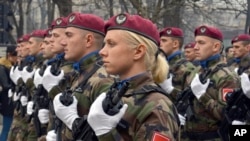Bosnia's security agencies are investigating a Serbian right-wing group that the national government said Tuesday was a paramilitary unit formed to create "a problem" for those opposed to Bosnian Serb President Milorad Dodik.
Members of Serbian Honor caused an uproar when they marched in full combat gear in the Bosnian Serb capital, Banja Luka, during a January 9 military parade to mark a national holiday in one the country's two autonomous regions.
The parade was staged as a challenge to a ruling by Bosnia's Constitutional Court to ban the holiday because it discriminated against the country's other ethnic groups. Bosnia is split into the Federation, shared by the Bosnian Croats and Muslim Bosniaks, and the Serb-dominated Serb Republic.
Serbian Honor is registered in neighboring Serbia but has an informal wing in the Bosnian Serb Republic, whose leaders say they are in the process of registering as a charity there.
"For me this is a paramilitary formation," Security Minister Dragan Mektic told reporters Tuesday. "The way they showed up is dangerous and their claims to be a charity are ridiculous."
Dodik's office said the reports were false and dangerous.
Mektic, member of a party that opposes Dodik, said the group was formed to "sow fear" and "pass a pre-election message that those who oppose the current government will have a problem."
A national election is due in Bosnia in October.
Dodik's SNSD party, which had been the dominant Bosnian Serb party at regional and national levels since 2006, saw its popularity slide in the last national vote and was excluded from a ruling coalition.
Russian link reported
Bosnian investigative web portal Zurnal, without citing sources, said the group had been trained in a Russian-funded humanitarian center in Serbia and would be organized to act against Dodik's political opponents.
The Russian Embassy said it did not even want to comment on something so ridiculous.
Mektic compared the group to paramilitary groups led by criminal gang leaders that emerged on the eve of Bosnia's war in the 1990s, and later committed some of the most gruesome atrocities against civilians during the conflict.
"What we need the least is the repetition of such events," Mektic warned. "I call on all institutions to protect this country and I expect a quick response."
Mektic told reporters he could not provide much of the operational data, but said the case would be documented and forwarded to the prosecutor this week.
Concerns are high regarding increasing instability in the Balkans, including secessionist pressures in Bosnia, a parliamentary boycott in Montenegro and renewed tensions between Serbia and its former province of Kosovo.
Western leaders have accused Russia, traditional ally of the Serbs, of seeking to exploit diminishing European Union leverage in the Balkans by manipulating political events in the region. Russia denies such allegations.





